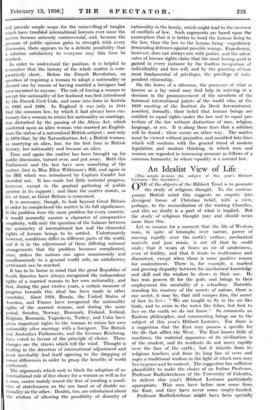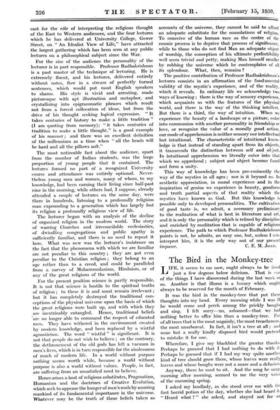An Idealist View of Life
[This article reviews the subject of this year's Hibbert Lectures.—ED. Spectator.]
ONE of the objects of the Hibbert Trust is to promote the study of religious thought. To the contem- porary British mind this suggests an enquiry into divergent forms of Christian belief, with a view, perhaps, to the reconciliation of the warring Churches, and this no doubt is a part of what is implied. But the study of religious thought may and should mean more than this.
Let us assume for a moment that the life of Western man, in spite of triumphs over nature, power of moving rapidly over the earth's surface, mechanical marvels and jazz music, is not all that he could wish ; that it wears at times an air of aimlessness, even of futility, and that it tends to restlessness and discontent, except when there is some positive reason for contentment. There is, for example, a marked and growing disparity between his mechanical knowledge and skill and the wisdom he shows in their use. He has won powers fit for the gods, and brings to their employment the mentality of a schoolboy. Notwith- standing his mastery of the secrets of nature, there is one secret, it may be, that still escapes him, the secret of how to live : " We are taught to fly in the air like birds, and to swim in the water like fishes, but how to live on the earth we do not know." • So comments an Eastern philosopher, and commenting brings me to the subject of this year's Hibbert Lectures. For there is a suggestion that the East may possess a specific for the HIS that afflict the West. The East knows little of machines, the material apparatus of its civilization is of the crudeSt, and its residents do not move rapidly over the face of the earth ; but it inherits from its religious teachers and from its long line of seers and sages a traditional wisdom in the light of which men may live in peace and be content. The suggestion has sufficient plausibility to make the choice of an Indian Professor, Professor Radhakrishnan of the University of Calcutta, to deliver this year's Hibbert Lectures particularly appropriate. Wise men have before now come from the East; and they have never come empty-handed.
Professor Radhakrishnan might have been specially cast for the rOle of interpreting the religious thought of the East to Western audiences; and the' four lectures which he has delivered at University College, Gower Street, on " An Idealist View. of Life," have attracted the largest gathering which has been seen at any public lectures on .a philosophical subject since the War.
For the size of the audience the personality of the lecturer is in part responsible. Professor Radhakrishnan is a past master of the technique of lecturing. He is extremely. fluent, and his lectures, delivered entirely without notes, flow in a stream of perfectly turned sentences, which would put most English speakers to shame. His style is vivid and arresting, made picturesque with apt illustration and metaphor, and crystallizing into epigrammatic phrases which result not from a forced collocation of ideas, but from the drive of his thought seeking logical expression. " It takes centuries of history to make a little tradition " (I am quoting from memory); " it takes centuries of tradition to make a little thought," is a good example of his manner ; and there was an excellent definition of the millennium as a time when " all the heads will be hard and all the pillows soft."
The most noticeable fact about the audience, apart from the number of Indian students, was the large proportion of young people that it contained. The lectures formed no part of a recognized University course and attendance was entirely optional. Never- theless young men and women, many of whom, to my knowledge, had been earning their living since half-past nine in the morning, while others had, I suppose, already attended a couple of lectures on the same day, were there in hundreds, listening to a profoundly religidus man expounding to a generation which has largely lost its religion a profoundly religious view of life. '
The lecturer began with an analysis of the decline of organized religion in the modern world. The story of warring Churches and irreconcilable :ecclesiastics, 'of dwindling congregations and public apathy is sufficiently familiar, and there is no 'need to repeat it 'here. What was new was the lecturer's insistence on the fact that the phenomena with 'which we are familiar are not peculiar to this country ; they are not even peculiar to the Christian religion ; they belong to an age rather than to a creed, and could be paralleled from a survey of Mohammedanism, Hinduism, or of any of the great religions of the world.
For the present position science is partly responsible. It is not that science is hostile to the spiritual truths of religion ; to these it is and must remain irrelevant ; but it has completely destroyed the traditional con- ceptions of the physical universe upon the basis of which the great religions were built up, and with which they are inextricably entangled. Hence, traditional beliefs are no longer able to command the respect of educated men. They have withered in the environment created by modern knowledge, and been replaced by a wistful agnosticism. The word " wistful " is significant. It is not that people do not wish to believe ; on the contrary, the dethronement of the old gods has left a vacuum in men's lives, which is in turn responsible for the aimlessness of much of modern life. In a world without purpose nothing seems worth while, because a world without purpose is also a world without values. People, in fact, are suffering from an unsatisfied need to believe.
Hence arises a host of religious substitutes, Pragmatism, Humanism and the doctrines of Creative Evolution, . which seek to appease the hunger of men's souls by assuring mankind of its fundamental importance in the universe. Whatever may be the truth of these beliefs taken as accounts of the universe, they cannot be said to afford an adequate substitute for' the consolations of religion. To conceive of the human race as the centre of. the cosmic process is to deprive that process of significance, while to those who do not find Man an adequate object of worship, the conception of his ultimate perfectibility well seem trivial and petty, making Man himself smaller by robbing the universe which he contemplates of all its splendour. What, then, remains The positive contribution of Professor Radhakrishnan's lectures consists in an affirmation of the fundamental validity of the mystic's experience, and of the reality, which it reveals. In ordinary life we acknowledge two ways of knowing ; there is the way of sensory experience, which acquaints us with the features of the physical world, and there is the way of the thinking intellect. But there is a third, the way of intuition. When we experience the beauty of a landscape or a picture, enter into communion with another personality in friendship or love, or recognize the value of a morally good action, our mode of apprehension is neither sensory nor intellectual but. intuitional, The characteristic of intuitional know- -ledge is that instead of standing apart from its objects, it transcends the distinction between self and. object. In intuitional apprehension we literally enter into that which we apprehend ; subject and object become fused and form a unity.
This way of knowledge has been pre-eminently the way of the mystics in all ages ; nor is it beyond us. In aesthetic appreciation, in moral experience and in the inspiration of genius we experience in beauty, - goodness and truth partial aspects of that reality which the mystics have known as God. But this knowledge is possible only to developed personalities. The cultivation of good taste is, we admit, a necessary preliminary to the realization of what is best in literature and art, and it is only the personality which is refined by discipline and enriched by meditation that is capable of religious experience. The path to which Professor Radhakrishnan points is not, he admits, an easy one, but, unless I mis- interpret him, it is the only way out of our present











































 Previous page
Previous page